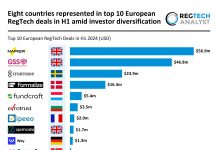RegTech can bring huge benefits, however; the industry needs to be made more aware of what’s on offer, according to an Intermediary Director at a leading asset manager.
Ever since the global finance crisis struck in 2008 the industry has been awash with ever changing regulation. In a bid to protect consumers, investors and safeguard ecosystem regulators around the world have introduced new legislations; however, this has increased the burden on organisations operating in the financial services space.
In an interview with RegTech Analyst, the director said: “I deal with the way we handle the increased demand from legislation, which is becoming more and more complicated and difficult to monitor and successfully implement. One of the tools which can help us is going to have to be adoption of more technology.” However, identifying the right solution is difficult and time consuming the organisation he added.
“Some of those solutions exist and some of them don’t. I have the view that people like myself are not even aware of some of the solutions out there.”
According to Research by RegTech Analyst, more than $6.1bn has been raised by RegTech companies across 529 deals since 2014. The RegTech sector expanded steadily between 2014 and 2017, with funding increasing at a CAGR of 12.4% and annual deal activity staying above 100 transactions during the period.
However, 2018 has been a standout year for RegTech investment, with interest in the sector showing no signs of cooling down. More than $2.5bn was raised in the first six months of the year, which is equal to 87.2% of the total capital raised by RegTech companies in 2015, 2016 and 2017 combined.
The spike in funding demonstrates that the RegTech is maturing as participants adjust to the implementation of new regulations, such as GDPR and MiFID II, as well an increasing focus on AML/KYC. Despite investors pouring money into the sector, combined with a steady increased in the number of solutions in the market, there is a notion of lack of adoption by financial institutions.
“There is so much happening at the moment it is very difficult to keep track,” according to the director. “I am one of the main decision makers in this business and own part of the business, but it is hard to know what is out there. The bottom line is having he knowledge and time to look at RegTech and access it
“I don’t think there is one solution out there that is the answer to all the challenges and it’s still early days, but we have seen some benefits.”
The asst management’s investors consist of Private Individuals, Pension Funds, Corporate, Credit Union and Charity investors. Portfolios consist of Capital Secure Bonds, Managed Funds, Absolute Return Funds, and Commercial Property Funds.
By offering a range of investment products, the asset manager is faced with a barrage of regulations laid out by the Central bank of Ireland, in addition to global legislation such as GDPR and MiFID II.
“When I am talking about regulations, I am not just talking about MiFID II. We are MiFID II regulated, but I am talking about AML regs as well. We have had a number of criminal jurisdictions acts being implemented over the past few years.
“This keeps upping the game in terms of the criteria to be applied to different categories of investors and how to identify them. It is just becoming more convoluted and taking up more time. But the bottom line is I do think technology can help.”
The significant difference in what is required to complete an investment and be compliant also depends on whether you are coming from an MiFID II perspective or a perspective or what I call a ‘life office perspective’, according to the director.
“It is almost like a regulation arbitrage situation, it is easier for the advisor or broker to deal with a life investment than it is with a MiFID II investment. It is more demanding.”
Despite admitting to having little time to access and find RegTechs, the asset management firm has already tapped two RegTechs to help meet different requirements and improve efficiency.
New reporting requirements by the Central Bank of Ireland pushed the firm in looking to an alternative to a ‘paper-based approach’, stumbling across AQMetrics.
The Ireland-based RegTech provides legal governance, risk & compliance (GRC) software for financial services firms trading on the global financial markets. Through its suite of cloud-based solutions, AQmetrics supports a full range of global regulatory reporting for recent and emerging directives including MAD II, MiFID II and the AIFM Directive. The firm also provides a complete reporting solution that enables risk aggregation and is based on OPERA.
Its risk analytics empowers the automation of traditionally resource-intensive and error-prone processes to ensure intuitive, fast, and cost-effective electronic compliance risk management, regulatory reporting and document management.
“The legislation was launched earlier this year and it took a long time to bed down and get active with the interruption. While the central bank points to the legislation it doesn’t help interrupt it. Once we have worked it out between us and we make sure we all on the same standard, then we had to wait for the central bank to make sure its ok.”
“Sometimes it is not even clear if our investment types had to be reported, just trying to get an accurate answer on that took months. Then is turns out that some do, and some don’t. While I appreciate that all of this is to protect client and that’s important, it has all got a bit complicated. The real issues have been forgotten in all of it, which is protecting the client.”
Once these solutions and challenges had everything bedded down, the firm than realised that it didn’t have the internal solutions to do it correctly. So, it looked for something that could and
The director argues that a sandbox, which allows companies to test products, which would a great benefit to help overcome some of these issues.
“In other countries, where there are sandboxes in place, you can try stuff out beforehand and see the reaction of the regulator. That would be extremely useful, but we don’t have that environment in Ireland so have to make do with what is there.”
The asset manager has also partnered with ID-Pal which provides an efficient, streamlined KYC solution that allows firms to onboard more clients whilst meeting regulatory requirements. ID-Pal’s web portal (for the business) and app (for the customer) captures, verifies and stores customer identity documents and information.
“ID-pal app was a made to go solution for an issue which continually stops business being completed with us, which is institutional inaccurate AML documents. We saw this as a great way to speed up the process.”
Copyright © 2018 RegTech Analyst






